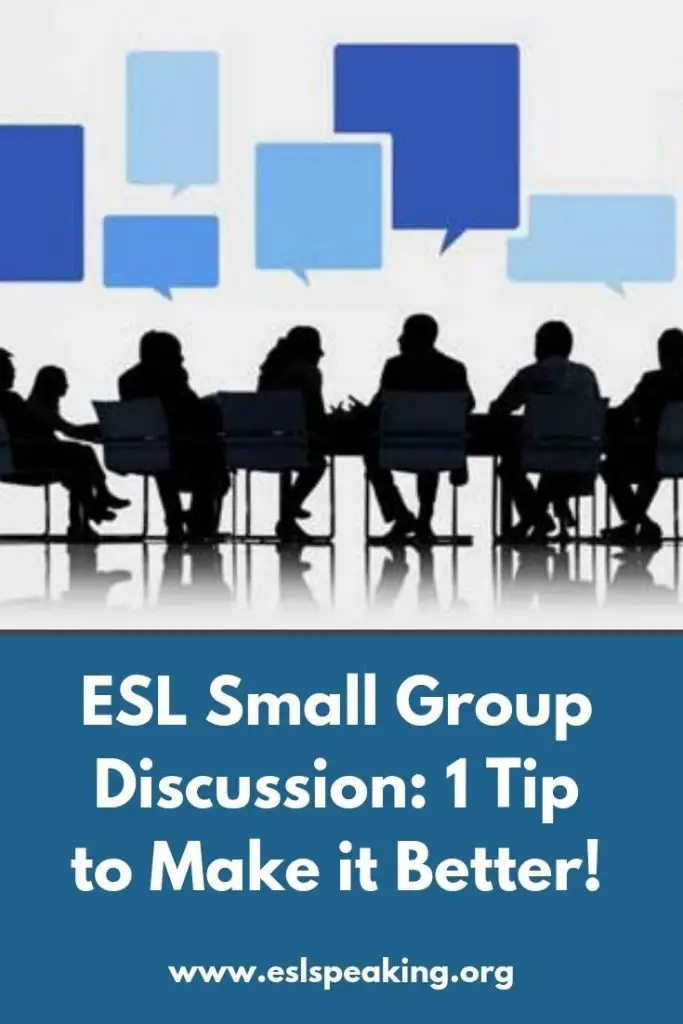If you’re looking for some tips for ESL ESL discussion, you’re in the right place! Keep on reading for all the ideas you need to make your ESL discussion even better.

ESL Small Group Discussion Activities and Tips
Do you have discussions in English in your ESL or EFL classes? Then you’ll need to check out our top tips for making them even better.
Top 10 Tips for ESL Discussion
Keep on reading to find out more about giving students thinking time before having a discussion, along with some other ideas for ESL discussions! Follow them and you’ll certainly have fun and interesting conversation classes, for both you and the students.
Tip #1: Include Some Thinking Time
The key to having better results with this kind of activity is to give some thinking time! This is particularly true with beginner to low-intermediate students.
More advanced students will be able to speak more “off the cuff” and may actually think it’s kind of strange if you give them time to think about their answers for simple questions like this.
My best advice is to use your discretion. You know the level of your students and whether or not they would benefit from a minute or two to collect their thoughts before speaking.
How Much Time? 2-3 Minutes Usually is a Good Rule of Thumb
In this particular case, 2-3 minutes of thinking time works well. That way, students can have a solid story that they want to tell for each question. If you put students on the spot, they’re forced to not only think of a story but worry about what they’re going to say in English as well.
These two or three minutes for thinking can be used in a lot of cases, especially with beginner-level students. I’ve found that the quality of answers is considerably better when I do this and the students aren’t so reluctant to speak out in class.
Thinking Time Makes for Better Follow-Up Questions Too
It also makes it easier to ask follow-up questions since the initial utterance is likely to be something of substance instead of just random things put together in no coherent order.
The other students in the class will be able to understand each other’s answers in a more meaningful way if you allow for thinking time.
Should Students Write out their Answers for ESL Discussions?
Even though I give students thinking time, I make a point to tell them NOT to write out full sentences. This turns the activity from a speaking one into a writing one.
Instead, they can only write themselves a few notes on a piece of paper. Before turning my students loose to do their thing, I give them this example for the question about the embarrassing moment:
- Shopping mall
- Old Navy
- Many people
- Glass window
- Run away!
Can you picture the story? When I tell the story, I add in all the details and speak in sentences. However, when students write the story out, it becomes a writing exercise and not a speaking one.
Put Yourself in the Student’s Shoes for Small Group Discussion
I know that if someone asked me to tell a story in Korean, I could maybe do it but not when put on the spot. In fact, I’d be really terrible and would get all flustered and stressed out. If I had a few minutes to look up a word or two in the dictionary and organize my thoughts in my head, it might be possible.
Try Giving Thinking Time to your Students for Group Discussion Activities
Give students some thinking time before they have to speak. But, encourage them just to think in their heads and not write out full sentences because it then becomes a writing activity instead of a speaking one.
Tip #2: Try Some Interactive Games and Activities for Small Group Discussion
One of the common problems that I see happen in ESOL classes is that the teacher just says something like, “Okay, talk to each other about XYZ.” But, they don’t give any discussion starters or further direction than that. Sure, there are a few students in your class who have a higher level of English and are naturally outgoing that can do this. But, many of the others? It’s not easy!
That’s why I much prefer to use some group discussion activities. They have a framework for them and give students a reason to talk to each other. In most cases, they have a task to complete or something to learn about their partner(s).
Do you want to know more about this? You can check out my top recommendations here: Interactive ESL Activities.
Tip #3: Use a Lesson Plan for ESL Discussions
Just because your students want to do small group discussions in your class, doesn’t mean that you shouldn’t plan a lesson! The best ones have a lead-in/setting the context, a reading or listening passage, vocabulary or grammar focus, and then some speaking activities.
By doing a complete lesson, the content will be much more memorable. Plus, you can sneak in a bit of grammar or vocabulary learning into your discussion time too. Do you want to know more about how to plan an ESL discussion lesson? You’ll need to check this out:
How to Plan an ESL Speaking Lesson.
Tip #4: Teach Students How to Keep the Discussion Going
If you have a larger class, you’ll probably want to break your students up into smaller groups so that they can have a small group discussion. This gives each student far more talking time than doing it all together as a class.
However, this also means that students are responsible for keeping the conversation going. The good news is that they probably already know a few strategies for doing so. And of course, you could also teach them a few more.
Tip #5: Use a Warm-Up Before Group Discussion Activities
For an ESL Discussions class, I strongly recommend using a warmer activity. After all, the last time many of your students will have spoken English is in your class!
Ease them into ESL small group discussion and speaking with a quick warm-up. You’ll find that students are more ready to jump into the heart of the lesson if you do one. Here are some of my favourites:
Tip #6: Use Interesting Discussion Questions
- Amazon Kindle Edition
- Bolen, Jackie (Author)
- English (Publication Language)
- 76 Pages - 07/02/2020 (Publication Date)
Starting off with interesting and fun group discussion questions is half the battle. But, it’s not always easy to be creative and think of great ones off the top of your head. Not to worry though. Here are my go-to questions that I use in my own classes.
You’re going to love this book over on Amazon: 1005 ESL Conversation Questions. It’s the book you need if you want to make your small group discussions more interactive, interesting and fun for both you and the students.
The conversation questions in the book are arranged into categories to make it easy to dedicate an entire class to a certain topic. You can find the book in both digital and print formats. Keep the book in your teacher bag to pull out in case of an emergency. Or, consider keeping it on the bookshelf in your office to use as a handy guide when planning lessons.
Either way, get ready for some serious ESLdiscussion awesome in your life with this book of conversation questions! Had over to Amazon to find out more details about it and to pick up your copy today:
Tip #7: Encourage Fluency vs. Accuracy in ESL Discussions
It’s often the case when speaking that our students can get stuck worrying about accuracy instead of just speaking to someone else. Before starting the activity, I always point to out my students that the purpose of discussion time is communication.
This means that as long as their partner is able to understand what they mean, it doesn’t matter so much about perfect in terms of grammar. This can lead to more interesting and fun discussions. I also tell my students to put away their dictionaries and cell phones. If they don’t know a word, the challenge is to try to explain what they mean without it.
I like doing discussion time like this because it replicates life in a more natural way. When you’re talking to someone on a date or in a shop, you won’t be able to pull out your cell phone to look something up. Your conversation partner will quickly become very bored and tired of talking to you!
Tip #8: Give Students some Input on Discussion Topics
I love to ask my students what they want to talk about. Some people are interested in things like pop culture while others aren’t. Some people like talking about scientific things while other people have no interest in that! Ask for input from your students and you’ll find that they’re more invested when it comes time for speaking and listening.
Tip #9: Change Partners Frequently
Have you ever noticed that students often sit with the same partner almost every single day in class? We’re creatures of habit and this is entirely normal. However, to have a fun group discussion time, mix things up and get students talking to different people.
Tip #10: Get Students Moving
Do you know those sleepy, tired classes of students? It’s pretty common on Monday morning or Friday afternoon. The best way to get some energy back into the classroom is to get students out of their seats and moving around a bit. I find that the easiest way to facilitate this is to choose group discussion activities wisely. Some of the best ones include:

ESL group discussion activities and teaching tips
ESL Discussions Starter Questions
In the ESL textbook, Smart Choice: Level 2, there are some small group discussion starters in one of the chapters. The 4 questions are:
Have you ever met or seen a famous person?
Have you ever been in an accident?
What’s your most embarrassing moment?
Have you ever experienced a natural disaster?
(As an aside, the Smart Choice series is a good choice if you’re looking for a simple, 4-skills book for beginner-level students. Click on the picture below to buy it now on Amazon).
- Wilson, Ken (Author)
- English (Publication Language)
- 136 Pages - 09/27/2007 (Publication Date) - Oxford University Press...
Of course, there are discussion starter questions like this in just about every single ESL Textbook! This is just one example, so please adapt these ideas for small group discussions to suit your needs.
FAQs about Small Group Discussions for ESL
There are a number of common questions that people have about ESL small group discussion. Here are the answers to some of the most popular ones.
What are ESL discussion activities?
ESL discussion activities involve learners engaging in spoken conversations about various topics to enhance their language skills and foster communication.
Why are discussion activities important for ESL learners?
Discussion activities help ESL learners practice speaking, listening, critical thinking, and expressing opinions in a real-world context.
What are the benefits of using discussions in ESL classes?
Discussions promote fluency, vocabulary expansion, cultural awareness, and the ability to articulate thoughts effectively.
What types of discussion activities can be used in ESL classes?
Different types include debates, role-playing, group problem-solving, open-ended conversations, and guided discussions on specific topics.
How does a debate format contribute to ESL learning?
Debates encourage ESL learners to research, organize arguments, and present their viewpoints while practicing persuasive language.
How can role-playing be utilized in ESL discussions?
Role-playing allows students to simulate real-life scenarios, helping them practice language in context and develop conversational skills.
What’s the purpose of group problem-solving discussions in ESL classes?
Group problem-solving discussions encourage collaboration, decision-making, and the exchange of ideas in English.
What’s the role of open-ended conversations in ESL learning?
Open-ended conversations give learners the opportunity to express themselves freely and engage in spontaneous discussions, improving fluency.
How can guided discussions be effective for ESL learners?
Guided discussions provide structure while still allowing students to express opinions, making them suitable for various proficiency levels.
How can ESL discussions be balanced to accommodate different skill levels?
Offer a mix of simple and more complex topics, and provide support through vocabulary lists, sentence starters, or guiding questions.
What strategies can teachers use to manage ESL discussions effectively?
Teachers can establish clear guidelines for participation, encourage active listening, and moderate discussions to ensure everyone has a chance to speak.
How do you encourage shy or less confident ESL students to participate in discussions?
Create a supportive environment, allow preparation time, and use pair or small group discussions before larger class discussions.
Are there cultural considerations to keep in mind during ESL discussions?
Absolutely, be mindful of cultural differences in communication styles, respecting diverse viewpoints and encouraging cross-cultural sharing.
How can teachers assess ESL learners during discussion activities?
Assessment can be based on vocabulary usage, grammar accuracy, depth of ideas, ability to engage in the conversation, and active listening skills.
Have your say about this Tip for ESL Small Group Discussion!
Do you have a tip or trick to make English discussions go more smoothly? Or, what did you think about these tips regarding thinking time? Leave a comment below and let us know what you think. We’d love to hear from you.
Oh yeah, and don’t forget to share this tip on Facebook, Twitter, or Pinterest. It’ll help other English teachers, like yourself find this useful resource.

Tips to make ESL/EFL discussion time better.
Last update on 2025-06-16 / Affiliate links / Images from Amazon Product Advertising API







Leave a Reply